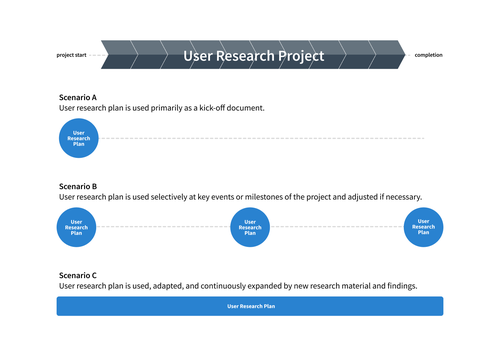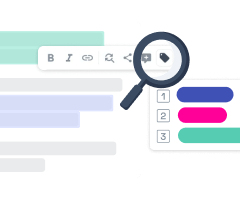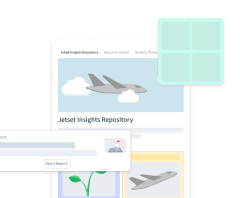
How to Create a Practical User Research Plan
A user research plan usually describes the written form of critical elements of an upcoming research project. The plan contains particular elements around the research subject and the project’s objectives and is often created at the beginning of a new project. But isn't this just paperwork that doesn't really add value? And is it only used to kick-off a new project? How do researchers actually use research plans in their practice?
We spoke with practitioners who plan or conduct research in different settings, from internal enterprise UX research to freelance research for cross-functional teams, to understand the role of research plans in the UXR practice. They shared their perspectives on user research plans and valuable tips to craft good plans. Additionally, you find a user research plan template for your next project in this article, that includes the crucial questions on what to put in a user research plan.
What is a user research plan?
A research plan communicates the essential information: what, who, why, when, where - in a written format. A good research plan helps you keep the overarching research goals in mind as you work through how you want to answer your research question(s).
While the research plan is usually crafted at the beginning of a new project, the subsequent use differs: Sometimes, it is rarely used after creation. But in other cases, the plan gets used during research execution and analysis or gets transformed into a final research report.

Researchers describe the plans as a crucial point for their research practice. Cordula Hansen, who works as a UX Designer and Developer in the field of Virtual Reality sees it as a moment of focusing on how to get to valuable research output:
„I'm responsible for getting good information from our participants. So making the plan is a really good way of thinking about what we should be doing, what we should be asking, and if we need quantitative research. So obviously rather than having all that in my head, I want to have it on paper and in front of me.“

Research plans (or sometimes also called research designs) are standard research practice, so let’s take a closer look at the benefits of writing a research plan.
Why write a user research plan at all?
Based on our conversations with research practitioners and our own experiences in creating research plans, a UX research plan significantly enriches the project quality and outcomes. These are the main benefits:
Ensure research effectiveness
Creating a plan forces you to think deeply about a research goal and the required steps to learn about the questions you want to uncover successfully. Sometimes you are tempted to go too fast with the risk of overlooking difficulties or finding there is actually no value. A plan can help you anticipate those challenges early and avoid mistakes.
Remain focused
Plans help you to focus on research goals and the research scope during the whole process. We spoke with Srishti Mehrotra, UX Researcher at Airtel, a global telecommunications company. With research plans, she finds it easier to focus on the main topics of interest and describes them as their GPS while researching:
/f/99166/2880x1604/0c84971b9f/srishti.png)
So the plan guides you towards answering the questions you set out to uncover. At the same time, it’s not written in stone, so be open to realigning the plan if needed.
Maximize value from time with participants
A plan helps you get the method, questions, and other administrative tasks ready before speaking to participants. As we all know, finding the right people for a user study is time-consuming and once they do make time for us we want to make the most out of it.
Strengthen team and stakeholder alignment
Research plans support team collaboration and communication. They keep the team informed about the current project. More importantly, a plan helps with expectation setting on research output and timeframe and brings everyone on the same page about the research subject, including your stakeholders.
Build trust in research
Additionally, a research plan can support you in promoting UX research as a discipline in your organization. Introducing a template for research plans makes it easier for everyone, especially non-research colleagues, to get familiar with the research, get into a conversation about it, and this can help gain trust around findings as well. In practice, a UX research plan "skeleton" affects the research perception:
„The more it's repeated, the more people start expecting that particular format. They find it easier to connect back to the same format again and again. So we fill in some of the details, and then we discuss what this is, where we want to plug in the results, and then co-create that plan.“

How to create the research plan (effectively)?
Every research plan looks different depending on the setting and goals. So instead of showing you what a plan should look like - because we don't know your project - here are some general principles from our research experts that help you develop your own.
Tip 1: Target the outcome (not the method)
When starting with a user research plan, focus on the outcomes. In practice, sometimes, it's easy to get fixated on the methods that need to be applied. But when designing the plan, a focus on the outcome will help you identify the required stepping stones (including the best methods) to get you the type of information you're looking for.
Tip 2: Always adapt the plan’s scope and format
A research plan can consist of some bullet points or a complete strategy document and it varies according to the study and intended use.
In ux research practice, most of the time, no extensive (academic-like) paper is needed. At best, aim for the extent you really need. This means:
What do you (as a researcher) need to come to a thorough research insight or design decision?
Who do you need to get involved in the project? And what information do they need to give their go, get onboard, or use the research insights afterward?
Stéphanie Walter, who works as a User Researcher at Maltem, a global digital transformation and innovation consultancy, describes how the plan’s scope and emphasis need to be adapted, depending on the recipient:
„Sometimes you have to present a research plan to people who don't have a lot of time. That can be tricky. When I was working for a university, it was like: the more detail the better. But if you have to present to stakeholders and need to get buy-in, then you might choose another format, like something short where you're giving the main points, and you have to understand the language of the stakeholders.“

Regarding the research plan format, the practitioners describe that this can be anything from a simple notes document, a presentation, an email to the stakeholders, a paragraph in a research repository tool, to any other format.
The suitable format depends strongly on the role of the plan during the subsequent process. Think of how you want to use the plan during and after the project. For example, using presentation slides eases adding insights and research evidence later on. Or a research analysis tool like Condens enables you to integrate the plan right where you analyze, store and share research findings.
Tip 4: Craft it collaboratively
The process of creating a ux research plan is an opportunity for collaboration with, e.g., product managers, designers, and developers. This will not only strengthen team cohesion but is also the chance to gather required information on research boundaries and dependencies right from the start. Going into that conversation with a draft from an idealistic perspective can be a good conversation starter that will show points that need to be adjusted.
Research plan template
Templates as a basic framework guide your process, create consistency, and ensure you don’t forget essential elements.
All of the researchers we spoke to have crafted their own templates over time. Even if this was not their intention, templates have slipped in as Péter Balázs Polgár, (former) Senior UX Manager at Trustpilot, a leading online review and collaboration platform, describes how their research plan team approach changed: at the beginning, there was a concern that templates would lead to less reflection on user research plans. But that has not proven to be correct, as he goes on:
„We had templates anyway as people were copying and pasting sections from one plan to the next one. So in a sense I think we always had some templates, but they were not like ‘official’ but as we were there, we created official templates.“

So the point of the research plan template is that you can build on existing expertise that will impact all upcoming plans. Some researchers see the plan template as a full shopping shelf that you can go to and pick everything you need for the current research project.
To bring it all together here’s a research plan template, ready to use for your next research plan.
The listed questions will help you to get started by collecting the relevant information for your plan (and, therefore, your research project). Thinking through and entering this information will also help you identify areas to get feedback from your team and stakeholders before conducting the sessions.
Want to read more? Check out our articles about what a UX research repository can do for you and User interview analysis – turning raw data into insights effectively.






